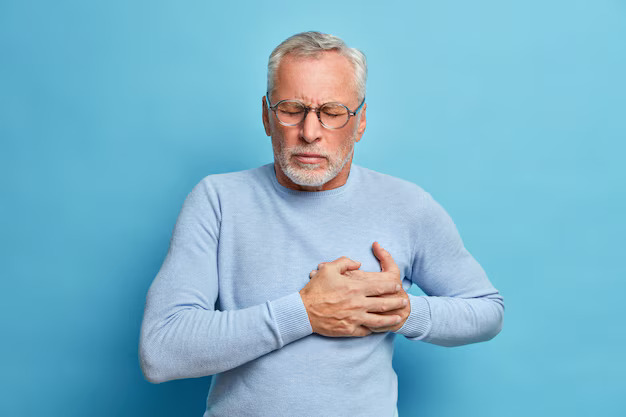9 Common Causes Of Heaviness In Chest
Chest heaviness is a sensation that can provoke concern, discomfort, and confusion. It is often associated with serious health issues like heart disease but can also arise from less critical conditions. Whether it’s a dull pressure or a crushing weight, understanding the underlying causes of chest heaviness is crucial for timely diagnosis and treatment. This blog explores nine common causes of chest heaviness, shedding light on symptoms, risk factors, and when to seek medical attention.

1. Angina (Reduced Blood Flow to the Heart)
Angina is one of the most recognized causes of chest heaviness. It occurs when the heart muscle doesn’t receive enough oxygen-rich blood. This is often a result of narrowed or blocked coronary arteries.
Symptoms:
- Pressure or tightness in the chest
- Pain radiating to the neck, jaw, or arms
- Shortness of breath
- Nausea or fatigue
Risk Factors:
- High blood pressure
- High cholesterol
- Smoking
- Diabetes
- Sedentary lifestyle
Note: Angina is a warning sign of coronary artery disease and should never be ignored.
2. Gastroesophageal Reflux Disease (GERD)
GERD is a digestive disorder where stomach acid frequently flows back into the esophagus, irritating its lining.
Symptoms:
- Burning sensation or heaviness in the chest (heartburn)
- Regurgitation of food or sour liquid
- Difficulty swallowing
- Feeling of a lump in the throat
Triggers:
- Eating large meals
- Lying down after eating
- Spicy or fatty foods
- Caffeine and alcohol
GERD-induced chest heaviness is often mistaken for heart-related pain, making it essential to distinguish between the two.
3. Anxiety and Panic Attacks
Mental health conditions like anxiety and panic disorders can manifest with physical symptoms that mimic cardiac issues.
Symptoms:
- Sudden chest tightness or heaviness
- Rapid heartbeat
- Shortness of breath
- Sweating
- Dizziness or lightheadedness
During a panic attack, the body goes into “fight or flight” mode, releasing adrenaline and causing muscular tension, which contributes to the sensation of chest heaviness.
4. Costochondritis (Inflammation of Rib Cartilage)
Costochondritis is the inflammation of cartilage that connects a rib to the breastbone. It can cause chest pain and heaviness that mimics that of a heart attack.
Symptoms:
- Localized pain when pressing on the chest
- Pain worsens with deep breaths or certain movements
- Absence of other heart attack symptoms like radiating pain or nausea
This condition is generally harmless and self-limiting but can cause significant discomfort.
5. Pulmonary Embolism (Blood Clot in the Lung)
A pulmonary embolism (PE) occurs when a blood clot blocks one or more arteries in the lungs. This is a medical emergency.
Symptoms:
- Sudden chest pain or heaviness
- Shortness of breath
- Coughing, sometimes with bloody mucus
- Rapid or irregular heartbeat
Risk Factors:
- Prolonged immobility
- Recent surgery
- Blood clotting disorders
- Smoking
PE can be fatal if not diagnosed and treated promptly.
6. Myocardial Infarction (Heart Attack)
A heart attack occurs when blood flow to a part of the heart is blocked, usually by a blood clot.
Symptoms:
- Crushing chest pain or heaviness
- Pain radiating to the back, jaw, or arm
- Cold sweat
- Nausea
- Sudden fatigue
Key Note: Not all heart attacks present with dramatic symptoms. Especially in women, symptoms can be subtler, like mild chest discomfort or unusual tiredness.
7. Pleurisy (Inflammation of the Lining of the Lungs)
Pleurisy is inflammation of the pleura, the membrane surrounding the lungs.
Symptoms:
- Sharp or stabbing chest pain
- Heaviness during breathing or coughing
- Pain localized to one side of the chest
- Fever and chills if caused by infection
Pleurisy is often caused by viral infections but may also result from autoimmune diseases or trauma.
8. Muscle Strain or Injury
Chest heaviness can also result from simple musculoskeletal issues, such as muscle strain or injury from overuse, poor posture, or physical trauma.
Symptoms:
- Pain or heaviness that worsens with movement
- Tenderness when touching the chest area
- No radiating pain or systemic symptoms
Causes:
- Heavy lifting
- Intense workouts
- Poor ergonomic habits
This type of chest pain usually resolves with rest, ice, and over-the-counter pain relievers.
9. Pericarditis (Inflammation of the Heart Lining)
Pericarditis is the inflammation of the pericardium, the thin sac surrounding the heart. It can result in sharp chest pain and a feeling of pressure.
Symptoms:
- Chest pain that improves when sitting up and leaning forward
- Heaviness or tightness in the chest
- Low-grade fever
- Fatigue
Pericarditis can be caused by infections, autoimmune disorders, or after a heart attack.

When Should You Seek Immediate Medical Help?
Chest heaviness should never be taken lightly. Seek emergency medical care if you experience:
- Persistent or severe chest pressure
- Shortness of breath
- Radiating pain to the arm, back, neck, or jaw
- Sudden dizziness or fainting
- Cold sweats or nausea
Even if symptoms are mild or seem unrelated to the heart, it is better to err on the side of caution.
Diagnosis and Testing
Diagnosing the cause of chest heaviness typically involves a combination of:
- Medical history and physical examination
- Electrocardiogram (ECG)
- Chest X-rays
- Blood tests (e.g., cardiac enzymes, D-dimer)
- CT scans or MRI
- Endoscopy (for GERD)
Your healthcare provider will determine the appropriate tests based on your symptoms and risk factors.
Prevention Tips
While not all causes of chest heaviness can be prevented, certain lifestyle changes can reduce your risk:
- Maintain a healthy weight
- Exercise regularly
- Eat a heart-friendly diet
- Avoid smoking and limit alcohol
- Manage stress effectively
- Control underlying conditions like hypertension or diabetes
Final Thoughts
Chest heaviness can stem from a wide range of medical conditions, from minor issues to life-threatening emergencies. Understanding the context and associated symptoms is crucial in determining the urgency of the situation. Never ignore persistent or severe chest discomfort. When in doubt, seek medical attention.
At www.sportandmedicalsciences.org, we emphasize the importance of awareness, early diagnosis, and proactive health management. Stay informed, listen to your body, and prioritize your well-being.